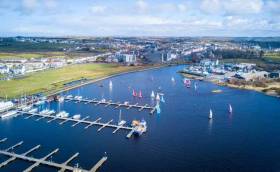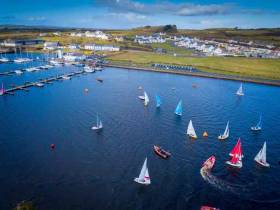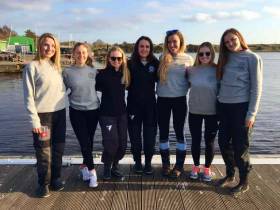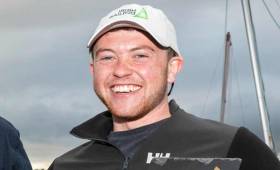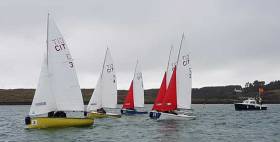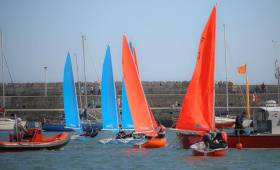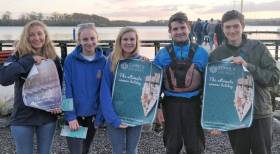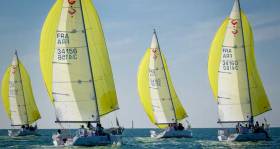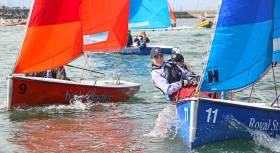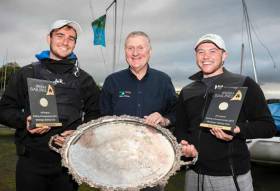Displaying items by tag: Team Racing
A successful Irish University Sailing Association (IUSA) Intervarsity team racing championships concluded today at Kilrush Marina on the Shannon Estuary in County Clare.
To a bystander not familiar with team racing it may have appeared somewhat chaotic with lots of boats, whistle blowing and flags. Team racing encourages an indepth knowledge of the rules and the umpires did a fantastic job in ensuring racing went off smoothly. The round robin series consisting of one hundred and thirty seven races followed by twenty eight quarter final races were all completed on the first two days. On the final day's racing twenty three races were run to complete the semi finals and finals. Twenty eight teams representing eight Irish universities, two Scottish universities and one hundred and sixty eight competitors in total took part. Conditions on the final day were excellent for racing with a light to moderate westerly breeze.
Racing concluded with everyone off the water and tidyed up in time for the rugby match. Overall winners lifting the IUSA Plate were UCC 1. NUIG Galway, co-hosting with UCC for the first time reached the semi-finals in their fleet. Credit must go to the student organisers from both universities for an extremely well run event. Prizegiving takes place in the Temple Gate Hotel in Ennis this Saturday night.
The universities represented were National University of Ireland Galway (NUIG), University College Cork (UCC), University of Limerick (UL), Dublin Institute of Technology (DIT), University College Dublin (UCD), Dublin City University (DCU), Trinity College Dublin (TCU), Queens University Belfast (QUB), Stratclyde University (SU), Scottish Student Sailing (SSS).
Final Results:
Gold Fleet: 1st UCC 1, 2nd SSS 1, 3rd UCD 1
Silver Fleet: 1st UCD 2, 2nd UCC 3
Bronze Fleet: 1st DCU 1, 2nd UCC 4
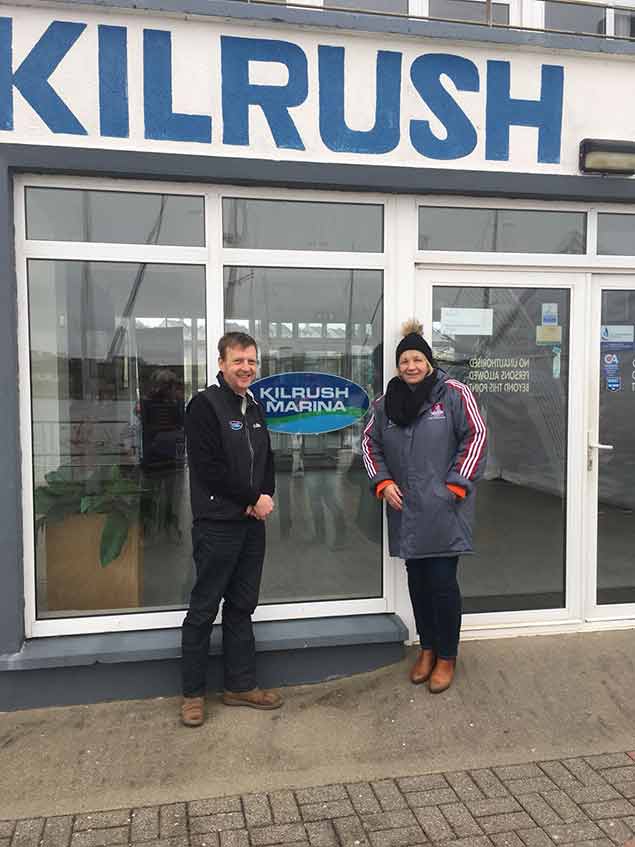 Simon McGibney of Kilrush Marina with Kathy Hynes Development Officer for Clubs and Participation NUIG
Simon McGibney of Kilrush Marina with Kathy Hynes Development Officer for Clubs and Participation NUIG
Intervarsity Team Racing Champs Underway at Kilrush Marina
The 2018 Intervarsity team racing championships started yesterday at Kilrush Marina on the Shannon Estuary in County Clare. The event organisers for this year's event are NUIG Galway and UCC Sailing Team.
Conditions on day one were ideal for team racing with over twenty teams taking part representing colleges across Ireland, Northern Ireland and international teams from Strathclyde University in Scotland.
It was a busy day for the five umpires on the water and race organisers completed 87 races. The 180 students transferring on & off the water were cheered on by lots of local supporters.
Entertainment off the water for students taking a break between races included bouncy castles, sumo wrestling & a BBQ.
Last weekend (24/25 February), Dublin University Sailing Club Women’s Team travelled to Glasgow to compete in the annual RYA BUSA Ladies Team Racing National Championships. It was the first time in years that Trinity has sent a team to this event. This years competition was hosted by Glasgow University Sailing Club and The University of Strathclyde Sailing Club. Racing took place over two days in Lochore Meadows with teams from all over the UK and Scotland. Trinity was the only team from overseas.
Racing kicked off on Saturday morning with a total of 85 races taking place. Despite freezing conditions, the wind was favourable and the sun shined until the racing was finished for the day. Sunday morning took off slightly slower due to little wind with ice covering the lake bringing on another freezing day for sailors. The racing was arranged into leagues on Sunday following a sufficient number of races taking place the day before. Following stiff competition on Saturday, DUSC qualified for Bronze Fleet. The team won every race in the league qualifying them for the final. DUSC raced GUSC in the final, winning 2/2 races, proving the trip overseas to be a success. DUSC were unlucky with racing on Saturday however proved their capabilities and strengths as a team on Sunday.
A meeting held by the RYA took place on Saturday evening which aimed to discuss mechanisms to encourage more women helms in University Sailing. Caitlin Waters, captain of the DUSC Women’s Team and International Officer for the Trinity Sailing committee said that it was “a great opportunity to have a discussion with race officials and women from other Universities about ways to encourage more talented women to helm when they enter University Sailing.” DUSC is proud to have an increasing number of women helming in the club, and hope to push this further in the future.
The next event that DUSC will be competing in is IUSA Intervarsities which takes place next week in Kilrush, Co Clare hosted by UCC and NUIG.
Liam Manning is November’s “Sailor of the Month (Inshore)
With the year drawing to a close, it looked as though Liam Manning of Schull would be seen as 2017’s ultimate bridesmaid, as he was crew for Fionn Lyden’s All-Ireland Sailing victory in October.
But the dark days of November came up trumps for Manning – he captained the all-conquering University College Cork team to overall victory in the mid-November Intervarsities team racing in Baltimore, keeping a formidable array of talent in line.
University College Cork Crowned Irish Team Racing National Champions
For the first time ever Baltimore Sailing Club welcomed the Irish Team Racing Associations National Championships. It proved to be one of the most exciting Team Racing finals of recent years. With a high quality entry of teams in the event there was not a dull moment as the event unfolded. The organisers and umpires had their work cut out as this was an intensely competitive event in which every race was closely fought..
The Irish Team Racing Nationals featured top teams from the Irish Team Racing scene, with sailors such as Fionn Lyden, Scott Flanigan, Philip Doran, Mark Hassett and Fynn Lynch amongst others.
The championship consisted of two full round robins and a knock-out series with semi-finals and finals. With beautiful wind conditions, but a bit overcast, the first day saw an early lead from University College Cork lead by Mark Hassett leading a comfortably, but chased by second pack of 6 teams within 4 points of each other.
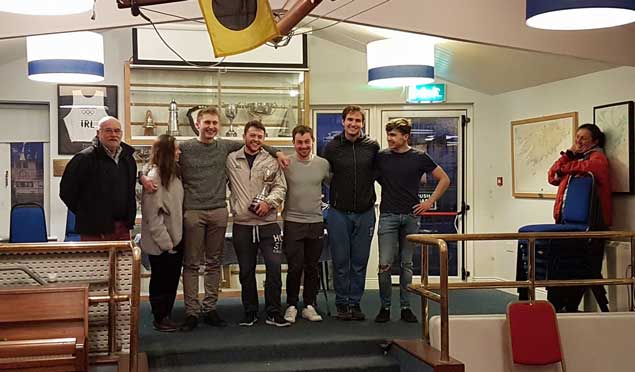 Team racing champions UCC1 celebrate at Baltimore Sailing Club. Photo: Facebook/BSC
Team racing champions UCC1 celebrate at Baltimore Sailing Club. Photo: Facebook/BSC
The second round robin, was completed in the early part of Sunday morning, again with beautiful wind conditions. The excitement did not diminish during day two, which saw again an action-packed day of aggressive and tactically charged races by all teams. University College Cork senior team managed to come on top winning all their races. A young team from UCD lead by Johnny Durcan - with Fynn Lynch as second followed closely. In third place was a Trinity based team, Mr March 2017, lead by Scott Flanigan, who had taken the IUSA Championship earlier in the year. Finally, in fourth place after the two round robins was the junior team from UCC, rapidly emerging as one of the most competitive teams on the circuit. The surprise came from REYS, a top team with UCD alumni lead by Philip Doran, that could not make the final cut to the knock-out round
The semi-final saw the senior UCC team confidently win their first two races against the young UCD team, but the second semi-final was fought out fiercely by the young UCC team and Mr March, who put all their effort into eliminating the younger team.
The final between UCC and Mr. March was a repeat of previous encounters of two teams that know each other well. Needing three wins out of five races each team displayed great sailing skill, boat control, tactical expertise and knowledge of the rules by both teams. Level after four tight races, the last race saw UCC get a perfect start winning all their pairs at the line. Mr March could not recover.
The next Irish Team Racing Assocoation Nationals will take place in November 17-18 2018 at the Royal St George Yacht Club in Dun Laoghaire. The Notice of Race and pre-entry will be open shortly.
Leaders:
1- UCC1 (Mark Hassett, Fion Lyden, Cian O’Regan, Liam Manning (capt.), Eoin Lyden, Lisa Smith)
2- Mr March 2017 (Richard Roberts, Scott Flanagan, Dan Gill, Emma Geary(capt.), Lucy Bolger, Kate O’Reilly)
3- UCD eez Nuts
4- UCC3
5- REYS
Team racing is an exciting and sociable sailing format in which a team of sailors work together to try and establish an overall winning combination for their team over their opposition. Team races are fast and furious and reward good starting, boat speed, boat handling, rules knowledge and team work skills. Racing is umpired, incidents are resolved on the water, with boats taking one or two turn penalties.
Team Racing has become a recognised discipline for improvement of close racing tactics and is used by a great number of Olympic and top sailors to hone their close quarter boat handling skills and rules knowledge.
Team Racing is organised in Optimist dinghies, two-handed dinghies (often Fireflies) and small keelboats. There is active school circuit and team racing is the basis of college sailing in Ireland, UK and USA.
ITRA is actively seeking experienced sailors who would like to taste the joys of umpiring team racing. On the water training will be provided. The minimum time commitment would be about three or four weekends a year.
Irish Sailing Gets Two More International Judges Appointed at World Sailing Conference
The Irish Team Racing Association (ITRA) has been one of the first organisations to congratulate two new IRL International Judges appointed at the recent World Sailing Conference in Mexico.
Both successful candidates have close links with team racing.
Cxema Pico is a leading Irish team racing umpire and current Treasurer of the Irish Team Racing Association. He is also well known for his activities with ICRA. Cxema is based in Greater Dublin.
Chris Lindsay, from Carrickfergus, is a leading umpire in the UK, where he is doing research for his PhD. He is currently Hon. Treasurer of BUSA.
Both Cxema and Chris are actively involved in the training of new umpires and judges.
This brings the number of Irish International Judges to five.
The process of qualification is long and involves attending an international seminar, passing a rigourous exam and being favourably evaluated by other judges at a number of international events, both here and abroad.
The sport of team racing, in which several teams of 2, 3 or 4 boats, compete in a series of team on team races, is preparing to celebrate the 70th Anniversary of its invention, which took place in Dun Laoghaire as a result of an Irish Dinghy Racing Association initiative.
Umpires play a key role in ensuring racing is fair. The depth of rule knowledge, and the speed with which umpires apply the rules seems to be a useful basis for the development and maintenance of many of the skills required by judges. All of the Irish IJs are actively involved in various forms of umpired racing - team, match, fleet or radio-controlled sailing at national and international.
Trinity Win University Team Racing Battle on Lough Erne
Dublin University Sailing Club are on a winning streak with 'TCD2' winning last weekend's Irish University Sailing Association (IUSA) Northern Championships ay Enniskillen, County Fermanagh.
Hosted by QUB Sailing Club, light winds on Lough Erne provided a challenge to racing for competing teams from UCD, DIT, DCU, UCC, NUIG and QUB
Next weekend is the ITRA's at Baltimore Harbour in West Cork.
UCD Sailing Team Compete at Student Yachting World Cup
UCD Sailing Team set off yesterday to compete in the Student Yachting World Cup, held near Marseille, France. Having qualified against stiff competition at the Student Yachting Nationals in April, the team will represent Ireland in the week to come. The five day event will consist of both inshore races, coastal races and a night race, all in Grand Suprise keelboats.
Skippered by Jack Higgins, the teams consists of Patrick Cahill, Conor Foley, Nicole Hemeryck, Lucy McCutcheon, Luke Murphy and Conor Kneafsey. Following an illustrious history of SYWOC podium finishes in the last ten years, the young UCD team hopes to bring home another medal for Ireland.
It has been a busy few weeks for UCD, with the SYWOC event and the first team racing event of the season (run by UCD in Wexford) falling in the same week.
Trinity Win the Trio in Wexford
The first IUSA team racing event of the 17/18 season took place this weekend (14th - 15th of October) in Wexford. ‘Irish University Sailing Associations Easterns,’ was held in Wexford Harbour Boat and Tennis Club, and run very successfully by University College Dublin (UCD). Over 150 sailors, representing nine colleges competed this weekend. Seven teams raced in the gold fleet, ten in silver and nine in bronze. With favourable weather conditions of 12-15 knots and an ample sailing area, a total of 85 races took place on Saturday. The racing continued on to Sunday, finishing up with rounds of quarter, semi and finals. All of which, Trinity took the lead in.
Trinity remain on top as they earned the winning titles in each of the three fleets. Trinity firsts were challenged by University College Cork’s (UCC) first team in the final on Sunday. Trinity worked hard to win 3 out of the 4 races. Trinity firsts were represented by Mark Bolger, Ruairi Finnegan, Conor O’Beirne, Isabelle Deladiennee, Kate O’Reilly and Charlotte Bowen. Trinity seconds took victory in the silver fleet represented by Caitlin Waters, Sandy Aplin, Douglas Elmes, Sophie Whelton, Maeve Lavelle and Susannah Mollen. Trinity sixths earned the win in bronze fleet, represented by Aonghus Byrne, Alex Walsh, Conor Twohig, Camila Kelly, Grainne Young and Meg Tyrrell. All teams were challenged throughout the competition from stiff competition in the form of UCCs 5 teams that sailed well throughout.
Trinity’s long line of results continues having won varsities in Clifden in March of last year. Trinity lost many star sailors at the end of last year and the results from this weekend display the strength and depth that has been built up over the last couple of years. Despite the lack of fully functioning boats to train in Trinity have played the cards they have been dealt and found alternative ways to practice with events such as the Dun Laoghaire Team Racing League which was set up by Trinity at the end of September with support from the Royal St George Yacht club. Securing sponsorship for new boats, to help maintain the standard is the college teams highest priority at the moment.
The historic 70th Anniversary staging of the All Ireland Sailing Championship has seen the famous silver salver depart for a long journey to its new home in Baltimore, as the winner is Baltimore SC’s Fionn Lyden, who was crewed to the win – raced in GP 14s – by Liam Manning.
Although Lyden is currently best known as the 2017 Under 23 Bronze Medallist in the Olympic Finn, he was racing at Mullingar as the nominee of the Irish Team Racing Association, for it was through inter-University team racing that his name first registered nationally as a sailor to watch.
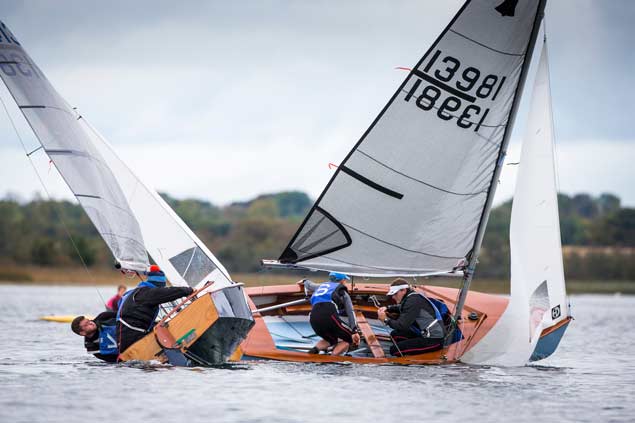 In the final race a strategic decision by Lyden resulted in a two-boat match race between him and Shane McCarthy that took place at one side of the race area
In the final race a strategic decision by Lyden resulted in a two-boat match race between him and Shane McCarthy that took place at one side of the race area
He and Liam Manning had their work cut out against a formidable field in the final, with defending champion Alex Barry of Monkstown Bay and the RS400 class, and GP14 World Champion Shane McCarthy of Greystones, both on top form.
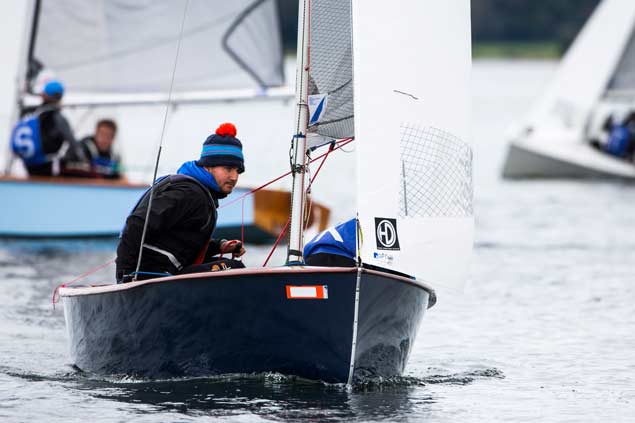 Fionn Lyden was a wild card entry on behalf of the Irish Team Racing Association
Fionn Lyden was a wild card entry on behalf of the Irish Team Racing Association
But Lyden kept his cool and finished the series with 16 points to the 18 of Alex Barry and the 19 of Shane MacCarthy, who came through to third overall in a tie-break with Laser sailor Sean Craig (Royal St George) also on 19.
Read our All Ireland preview by WM Nixon here
Irish Sailng adds (on Monday, October 9 at 1300): Fresh from winning bronze at the U23 Finn World Championships earlier this summer, Baltimore’s Fionn Lyden has won the All Ireland Sailing Championships at Mullingar Sailing Club today.
The series was decided on a knife-edge finale that saw Lyden match-race to the finishing-line with GP14 World Champion Shane McCarthy from Greystones who was denied victory by the tie-break in the series.
Lyden’s crew was fellow West Cork sailor Liam Manning from Schull and the pair represented the Irish Team Racing Association who were Wild Card entries in the championship that is celebrating 70 years.
Two very different days of racing tested the sailors: Saturday was a typical autumnal afternoon on Lough Owel – strong and quite blustery but manageable conditions apart from a few capsizes.
Sunday morning saw the repechage races to decide the last two places in the final, but then the wind dropped and the lake turned into a mirror. Patience from Jack Roy’s Race Management team was rewarded in the late afternoon when a light breeze picked up enough to allow three races in quick succession.
The going was slow, but in the final race a strategic decision by Lyden resulted in a two-boat match race between him and Shane McCarthy that took place at one side of the race area, while the rest of the fleet including last year’s winner Alex Barry battled it out for a podium place.
The final results were Fionn Lyden with crew Liam Manning of Baltimore SC; in second place were Alex Barry with crew Richard Leonard of Monkstown Bay SC , and in third was Shane McCarthy and crew Andy Davis of Greystones SC.



























